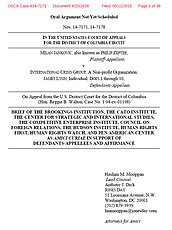Learn more about Cato’s Amicus Briefs Program.
Free speech can get awfully expensive when billionaires are involved—just ask the International Crisis Group, a charity that seeks to prevent war and related atrocities by monitoring conditions in the world’s most dangerous regions. In 2003, ICG published a report on the political and social climate of Serbia following the assassination of Zoran Ðinđić, the country’s first democratically elected prime minister after the fall of Slobodan Milošević. One of the issues noted there was the concern of “average Serbs” that powerful businesses were still benefiting from corrupt regulatory arrangements that dated back to the Milošević regime. One of several oligarchs mentioned was Milan Jankovic, who also goes by the name Philip Zepter. With an estimated net worth of $5 billion, Jankovic is widely believed to be the richest Serb (and one of the 300 wealthiest men in the world). His holdings include Zepter International, which sells billions of dollars of cookware each year and has more than 130,000 employees. One might think that a man responsible for running a vast business empire would have better things to do than suing a charity, but you’d be wrong. For the last decade, Jankovic has hounded ICG, relentlessly pressing a defamation suit, first in Europe and now in the United States. After ten years of litigation, the case finally comes down to a single question: Is Milan Jankovic a public figure? The Supreme Court has long held that the First Amendment’s protection of speech (and political criticism) requires libel plaintiffs who are public figures—like politicians and celebrities—to show that potentially defamatory statements were not only false but also published with “actual malice.” Under this standard, the defendant must have actually known that the statements were false; a negligent misstatement or the innocent repetition of another’s falsehood isn’t enough. In an amicus brief filed in the U.S. Court of Appeals for the D.C. Circuit, Cato, along with a diverse group of organizations including the Brookings Institution, Council on Foreign Relations, and PEN American Center, argues that while Jankovic is not a politician or other government official, he should still be treated as a public figure for the purpose of this case. Under the “limited public figure” doctrine, the Supreme Court holds that private citizens become public figures when they “thrust themselves to the forefront of particular public controversies in order to influence the resolution of the issues involved.” As we argue, Jankovic is in his own words one of Serbia’s most powerful and influential citizens, whose vast wealth and political connections gives him a near-unparalleled ability to shape the outcome of public debates. What’s more, Jankovic has played an active role in Serbian politics. He describes himself as one of the men responsible for overthrowing Milošević, and he once hired American lobbyists to represent the Serbian government in Washington. He’s even rumored to have used his own money to fund the government during a budget crisis! In short, Jankovic is the very definition of a public figure—and criticism of public figures, whether they be elected officials like Frank Underwood or shadowy powerbrokers like Raymond Tusk, must be privileged. Unless the weakest are free to criticize the most powerful, democracy is nothing but a house of cards.
